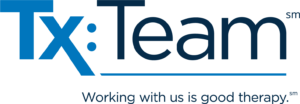Occupational Therapy Awareness Amid Stay at Home Guidelines
During Occupational Therapy Awareness Month, therapists are asking “what does Occupational Therapy look like amid coronavirus and stay at home guidelines?”
“The philosophy of Occupational Therapy focuses on improving performance in all areas of occupation to facilitate health and promote growth through change &/or adaptation. The ultimate goal is the achievement of health, well-being and participation in life through engagement in occupation.” (AOTA 2014).
“Occupational Therapy has a fundamental belief that a healthy lifestyle reflects the balance between work, play/leisure, self-care and rest activities.” (Journal of OT in Mental Health, Crist et al, Sept. 25, 2008).
A return to a balance in daily occupations can be achieved with Occupational Therapy through therapeutic exercise, therapeutic activities, activity modification and adaptation, when one is affected by undue stress, illness or injury, and by applying a similar philosophy in one’s own self care practices.
During this pandemic, how are we occupying our time? Everyone is currently affected by a significant amount of change, which requires the ability to adapt in a positive manner to maintain our own optimal health. This is a good time to take stock of our physical, mental, spiritual, as well as financial health. We have had to adapt the way that we are performing our daily routines. And by taking good care of ourselves, we are then able to engage with compassion toward others who need it…if you have 20 rolls of toilet paper and your neighbor only has 2 rolls left…kindly share!
April is Occupational Therapy Awareness Month. Occupational Therapy problem solves to help people adapt to change. Currently, everyone’s lives are disrupted in one way or another and all are forced to adapt to the changes. By now, most of us have found ways to adapt and fill the increased hours spent at home, or you may be running out of ideas. There are many resources available online to combat the anxiety, depression, boredom, and the “couch potato” syndrome that is being experienced related to the Stay at Home guidelines.
The following are some resources and strategies to help adapt and remain positively engaged while staying at home:
- The W.H.O is having a Health at Home Challenge on Twitter, go to Twitter.com/WHO/Status#HealthyatHome.
- Tao-Well.com – Tai chi & Qigong fit videos, focus on mindfulness, reducing stress, while promoting strength, flexibility and balance.
- Down Dog Yoga App – health care providers can get free access to their apps through July 1st.
- Woebot – free app to promote positive mental health.
- NHS.uk – sofa workout, as well as many other types of exercise videos.
- Spotify” app – has a variety of uplifting song playlists as well as podcasts.
- ”themodernproper” on Instagram – therapeutic and creative cooking ideas. A new recipe is shared daily on Instagram
Rather than binging on TV shows, we find ourselves coming up with other activities to occupy our time. Utilizing social media and video games, assembling puzzles, playing games, yard work, walking, biking, running, cooking, baking, arts & crafts, board games and cards have become increasingly popular, and quality time with family has become more important. Trying to maintain a sense of humor at this time, will also help to combat anxiety and depression. YouTube videos are a great source of humor. Even though at times it may seem like too much togetherness at home, we should cherish every minute that we have with our loved ones.
Change the way you look at things and the things you look at change.
Contributed by Erin Winters, OTR/L, PTA
Erin Winters, OTR/L, PTA
Erin is an Occupational Therapist with Tx:Team at Putnam County Hospital. She is a graduate of the Indiana University Occupational Therapy Program. Erin has extensive experience in the treatment of adults with a variety of diagnoses from neurological, orthopedics of the upper extremity and hand, as well as chronic or acute conditions.
